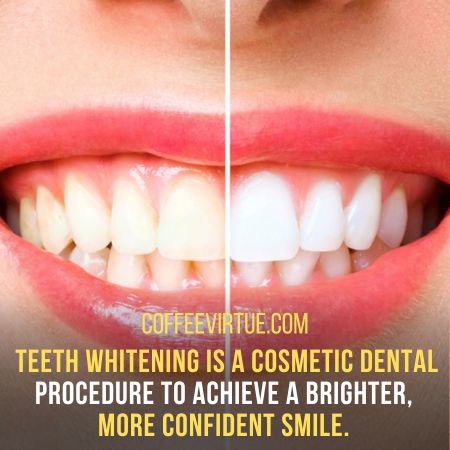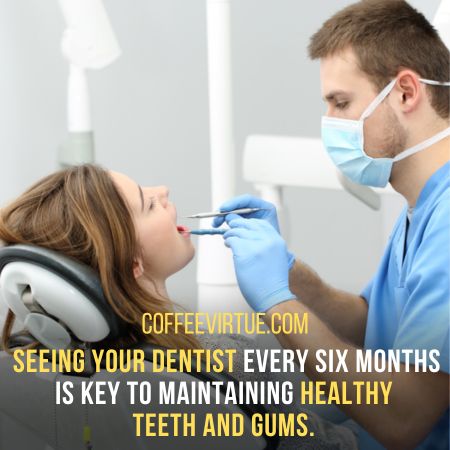How long after teeth whitening can I drink coffee? People have this concern after they have done teeth whitening treatment.
What Will I learn
This article will help you know how long you can drink coffee after teeth whitening. This article contains all the important information that you need.
How Long After Teeth Whitening Can I Drink Coffee?
After teeth whitening, it is best to wait at least 24 hours before you drink coffee.
This is because the hot liquid in coffee can cause sensitivity and irritate the whitened teeth. Drinks like latte coffee are examples of this.
Drinking coffee cannot undo your whitening treatment but can reduce its effectiveness. Some people don’t experience any problems after consuming coffee right away.

You might want to experiment with this depending on how your teeth react. If you decide to have a cup of joe, ensure it has cooled off first.
Hot beverages can aggravate any sensitivity caused by the whitening process. Also, add milk or cream to your drinks to protect your teeth from further staining.
The making of your coffee can also affect the process. If you have used a blade coffee grinder, it can cause more reactions.
Once your teeth are whitened, you can drink coffee without staining issues. Remember that it’s still important to practice good oral hygiene habits.
You should brush and floss regularly to keep your teeth looking their best.
4 Drinks to Avoid After Teeth Whitening
Knowing which drinks can cause discoloration is important to keep your teeth white. Many popular beverages can lead to teeth staining.
They cause dulling over time if not consumed in moderation.
Coffee, tea, soda, red wine, and dark juices can cause stains on teeth if drinking them frequently.
1. Coffee:
Coffee can cause discoloration of the teeth. This is due to its dark pigments, which stain the surface of your teeth, making them look yellow or brown.
This can be because of its high acidity levels. Some types of coffee contain chromogens, which can stain our teeth.
Discoloration can be hard to reverse and may need professional dental treatment.
2. Tea:
Tea can cause discoloration in many ways. The most common way is through oxidation. This happens when tea leaves come into contact with oxygen and turn brown.
Oxidation occurs more at higher temperatures. The longer your tea steeps, the more likely it will become discolored.
Certain types of tea, such as green or black tea, are more prone to discoloration than other varieties.
Incorporating other ingredients into your tea can contribute to discoloration.
3. Soda:
It’s no secret that soda can be bad for your teeth. Drinking soda regularly can lead to discolored teeth. It is due to the acids in soda.
These acids wear away at the enamel on your teeth. They leave them vulnerable to staining from other foods and drinks.
Those stains build up over time, leaving your teeth dull and yellowish.
4. Red Wine:
Red wine is known for staining teeth due to its high levels of chromogens and tannins.
While these natural compounds don’t cause cavities, they can lead to discoloration. This happens when the molecules from red wine are attached to particles in your enamel.
It causes a yellowish-brown stain that only professional removal can remove.
If you enjoy having a glass of red wine, keeping up with your oral hygiene regimen is important.
11 Tips To Keep Your Teeth White After Drinking Coffee
If you’re a coffee lover, chances are your teeth aren’t as bright and white as they used to be.
Coffee has been known to stain teeth, leading to an unsightly yellow or brownish tint.
Some easy tips help keep your pearly whites shining after enjoying your cup of joe.
1. Use Straws:
Drink your coffee through a straw. This may seem like an odd tip, but using a straw can help direct the liquid away from your front teeth.
This will reduce staining. Straw is best to protect your teeth from staining after drinking coffee.
2. Rinse with water:
Rinse with water after drinking coffee. As soon as possible, rinse your mouth with plain water.
You can use an alcohol-free mouthwash to minimize staining. This will help to keep your teeth white after drinking coffee.
3. Brush Regularly:
Brush and floss regularly to avoid staining. Regular brushing and flossing help to remove plaque, bacteria, and food particles.
Those which can lead to discoloration on your teeth. Ensure you brush twice daily for at least two minutes with fluoride toothpaste.
4. Use Whitening Toothpaste:
Whitening toothpaste contains special polishing agents. These help to remove surface stains while strengthening enamel and reducing sensitivity.
These products are usually safe to use once or twice daily. Make sure to follow the instructions on the package closely.
Also, make sure you use a quality toothbrush. The type of toothbrush affects teeth cleaning.
5. See Your Dentist:
Seeing your dentist every six months is key to maintaining healthy teeth and gums.

They may be able to recommend whitening products or professional treatments. These can help keep your teeth looking their best.
6. Avoid Certain Drinks:
Coffee, tea, soda, and red wine are all culprits in staining teeth. Cutting back on these beverages is a great way to reduce discoloration.
If you drink them, try using a straw and swishing water in your mouth afterward.
7. Try An Oil Rinse:
Oil rinses like coconut oil pulling are beneficial for oral health. It also helps reduce stains from coffee and tea consumption over time.
To oil pull, put a tablespoon of oil in your mouth. Swish it around for 10-15 minutes before spitting it out. Then brush your teeth with toothpaste.
8. Visit Your Dentist:
If you want a more expedited whitening solution, consider visiting your dentist. They will provide professional whitening treatments.
These in-office procedures can whiten teeth and may be covered by insurance.
9. Cut Out Cigarettes:
Cigarette smoking is one of the leading causes of yellowing teeth. It is due to its staining effect on the enamel of your teeth over time.
If you’re trying to keep your teeth white, it’s best to eliminate cigarettes from your lifestyle altogether.
10. Cut Back On Sugar:
Sugary food and drinks contribute to plaque buildup. This can cause your enamel to weaken and turn yellow over time.
Reduce your daily intake of sugary treats. It will help to keep your teeth white after drinking coffee.
11. Drink More Water:
Water helps flush away staining particles in the mouth. It also assists with saliva production.
This helps reduce bacteria buildup that causes stains. Drinking a glass of water after coffee can help remove any remaining staining agents.
All these tips can help you keep your teeth white and in better condition for longer.
8 Recommended Foods to Eat After Teeth Whitening
After getting your teeth whitened, you may be excited to show off your pearly whites. It’s important to maintain the results of your whitening treatment.
Here are some excellent post-whitening snacks that won’t damage or discolor your teeth.
1. Cheese:
Cheese is a great way to help protect your teeth after whitening. Cheese strengthens tooth enamel with its calcium content.
It increases saliva production, which helps keep teeth clean. Eating cheese can also reduce the acidity in your mouth.
It is beneficial for protecting freshly bleached teeth against staining agents.
2. Yogurt:
Yogurt is another snack you can enjoy after having your teeth whitened. It contains probiotics.
These help fight bacteria and other microorganisms in the mouth. It has calcium for strong tooth enamel.
3. Raisins:
Raisins are rich in antioxidants. These protect teeth from cavities, gum disease, and discoloration.
They also stimulate saliva production. This helps to flush away food particles and neutralize harmful acidity.
4. Strawberry:
Strawberries have natural whitening properties due to their malic acid content. This helps remove surface stains on teeth.
Eating strawberries can help keep gums healthy by fighting off bacterial plaque buildup.
5. Vegetables:
Vegetables like broccoli and cauliflower are crunchy alternatives.
They provide a good source of vitamins A and C, minerals like calcium and phosphorus, dietary fiber, and other nutrients. These are essential for healthy teeth and gums.
6. Fruits:
Fruits like apples, pears, and oranges contain natural sugars. They won’t harm your teeth if eaten in moderation.

Apples, in particular, stimulate saliva production. This helps protect against acids that can wear away at the enamel of your teeth.
7. Water:
Drinking lots of water is always important when it comes to taking care of your teeth.
Water helps wash away food particles and bacteria lingering in your mouth after eating.
8. Other Food:
Other nuts, grains, and leafy greens contain essential vitamins and minerals. They are beneficial for oral health.
They also stimulate saliva production and reduce plaque buildup on the teeth.
It’s important to choose various healthy foods when caring for your teeth. This will ensure you get all the nutrition you need while whitening your teeth.
Conclusion:
Teeth whitening is a popular cosmetic dental procedure. Many people pursue this to achieve a brighter, more confident smile.
The process involves using bleaching agents and other solutions. This help to lighten the color of the teeth and remove surface stains.
Understanding all your options before going for teeth whitening treatment is important.
It’s always wise to consult your dentist before using any whitening procedure. They can provide guidance and direction specific to your individual needs.